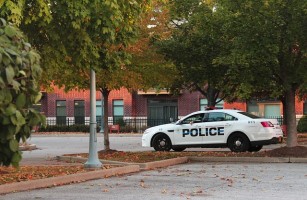Widgetized Section
Go to Admin » Appearance » Widgets » and move Gabfire Widget: Social into that MastheadOverlay zone
Crossing the Line: Why Community Relations Remain a Challenge
The views expressed are those of the author and do not necessarily reflect the views of ASPA as an organization.
By Andy Plumlee
March 17, 2017
Achieving successful community relations is complex and difficult. The need exists for community relations initiatives because law enforcement agencies are not an integrated part of the community —and yet, this is the very reason they so often fail.
The thin blue line represents a great divide. Community relations continue to be both a topic of national debate and frustrations for both police and community members. Police are in a difficult position: they see the worst humanity has to offer on a daily basis. Every encounter has the potential to become life threatening. With complete respect for the challenges officer must endure, this conversation cannot be had without acknowledging law enforcements history of abusive and negative interactions with the communities they police. Poor, immigrant and minority communities have endured especially bad treatment. Their fear and mistrust of police in their community is as well founded and valid as law enforcements fear for officer safety.
Barriers to community relations goes deeper than mistrust, they are intertwined with our human need to belong. We all want to belong and at the same time we actively exclude from our communities those who try to control our actions and behavior. Community relations efforts have historically competed with crime prevention efforts. The former is an inclusive practice, the latter is naturally exclusionary. Policies aimed at creating community relations are met with mistrust by many communities, especially those who have a long-standing history of strained relations with law enforcement agencies. These actions are usually seen less as attempts to improve relations and more as attempts to improve the police departments image. A common rebuttal is to let the community police themselves.
This seems a simple and logical solution but it fails to solve the problem for the same reason the problem exists. Community members who choose to police their community risk alienation from the community. It is not impossible to create meaningful connections between police and the communities they serve, but until both sides can move beyond the “us vs. them” mindset, such connections will remain unattainable.
problem for the same reason the problem exists. Community members who choose to police their community risk alienation from the community. It is not impossible to create meaningful connections between police and the communities they serve, but until both sides can move beyond the “us vs. them” mindset, such connections will remain unattainable.
Such relationships are different in other countries in part because cultural norms are different. In Japan, “cho’s”, or neighborhoods, are looked after by officers who are respected members of the community. I personally encountered Japan’s approach to community relations shortly after moving into my first apartment. I moved into a neighborhood of families and older residents. As the only American in this particular cho, my arrival did not go unnoticed. One sunny summer afternoon, I fell asleep and woke to a police officer wearing a helmet and visor standing over me. He demanded to know my name, age, date of birth and place of employment. He was respectful but it was clear he was in charge of the conversation.
I struggled to shake the feeling I had just been violated. This officer walked into my place of residence without permission and demanded to know who I was. I had done nothing wrong. As an American, this entire encounter felt wrong. I mentioned this to some of my Japanese friends who smiled and assured me I was in fact so lucky my local police officer knew who I was. If I was ever in any trouble he would know who I was and be ready to help. He was a valued member of the community. None of my neighbors approached me until this officer did. Afterwards, many came to introduce themselves and bring me small gifts and food. He was the protector of the community and the community was grateful for him. To me, it all felt a little like Mayberry — A fantasy land lost to the hallowed halls of Americana.
Building similar relationships in America will be difficult. Wounds on both sides are fresh in the minds of many. Mistrust runs deep and we are culturally driven to avoid open communication with those we perceive to be against us. Police officers are moral, honorable and exceptionally compassionate individuals who seek to create positive change daily. Community members are hardworking, ambitious and committed to the success of their community. Both want to belong and be respected for who they are. Many communities and law enforcement agencies are opening the lines of communication, but we have a long way to go and a lot more work to do. We must move away from the “us vs. them” mindset. When both sides begin to assume and recognize positive intent, real relationship building can begin. It will be hard, it will require us to own and stand accountable for all grievances past and present. It will require us to plan a new future together. It will require us to forgive, and to trust. Bridging the massive divide that is the thin blue line will require police and residents to become one community.
Author: Andy Plumlee is a dual MBA/MPA candidate in sustainable management at Presidio Graduate School in San Francisco, California. Prior to graduate school he served in the U.S. Navy as an Operations Specialist for 14 years where he achieved the rank of Chief Petty Officer. He can be reached at [email protected] or connect with him on LinkedIn.


Eric Watters
March 17, 2017 at 12:54 pm
Nice article Andy. Keep up the good work.
Andy Plumlee
March 21, 2017 at 12:10 pm
Thank you Eric and thank you for your support.